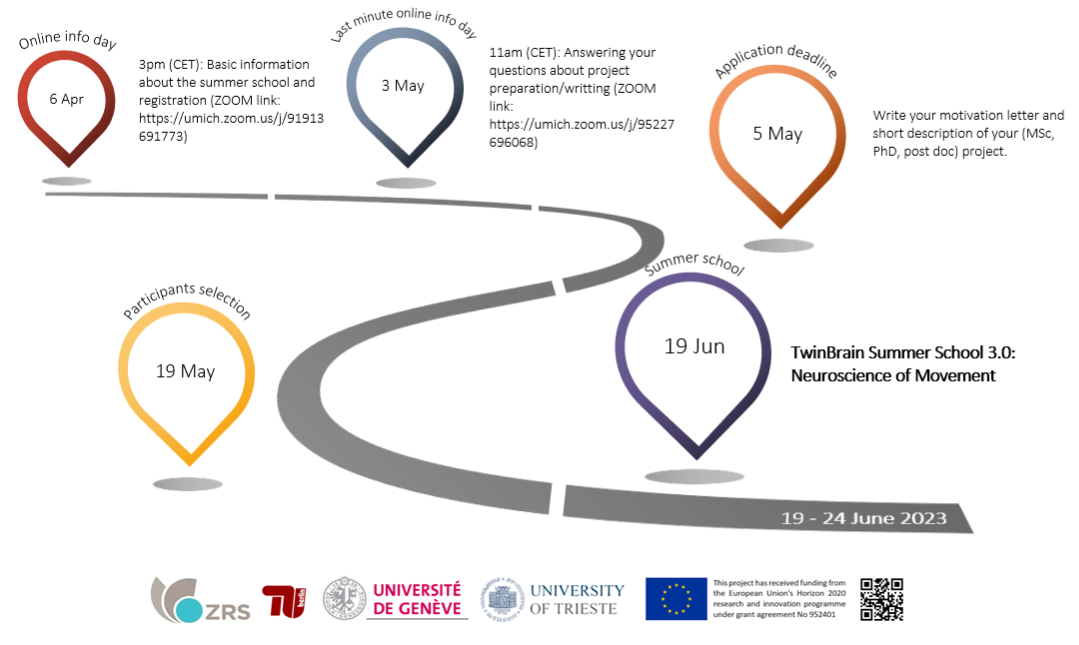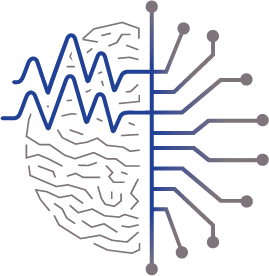Summer school
TwinBrain SUMMER SCHOOL 3.0
Neuroscience of movement
Key information:
When? 19 June – 24 June 2023
Where? Piran, Slovenia / Online
Who? Students (Masters and PhD) and post docs from the field of kinesiology and movement science, physiotherapy, psychology, cognitive (neuro)science, biomedical engineering, and related disciplines
What? Summer school to bridge the disciplines for a comprehensive understanding of brain complexity in health and disease
Pre-requirements? Registration (free), motivation letter with short project idea description for on-site students (limited up to 20)

Summer school overview:
Is it time to start bridging the fields in a multidisciplinary fashion to create new approaches for a comprehensive assessment of complex brain dynamics in everyday situations? Can this offer further insides into preventive and rehabilitative approaches? These questions and many more will be addressed in the TwinBrain summer school 3.0 with international speakers from Slovenia, Germany, Switzerland, Italy, Belgium, France, Luxembourg, the Netherlands, and USA.
In our daily lives, we do many things automatically. And although we often seem to react without the slightest mental effort, there are a multitude of complex processes going on in our brains. We do not realize how difficult the task is until we (re)learn a particular cognitive-motor task, such as keeping our balance on skis or while surfing or even grasping a spoon after a stroke. On the other hand, we know of several neurodegenerative diseases that are progressive and prevent the smooth performance of everyday tasks. James Parkinson already recognized that progressive Parkinson’s disease (PD) is associated with debilitating features of postural instability and gait difficulties (PIGD) such as falls and freezing of gait. PD initially causes physical symptoms. Later, problems with cognitive function, including forgetfulness and difficulty concentrating, may occur. As the disease worsens over time, many people develop dementia. In the current summer school, we will have an international team of experts covering the latest discoveries on the topics and offering insight into how brain imaging technology might contribute to understanding brain function and disease development. Recent advancements in wireless and wearable technologies allow us to take a step further into real life. Therefore, the latest developments in the Mobile Brain/Body Imaging (MoBI) approach will be presented.
Students (mainly PhD students and post-docs) will have the unique opportunity to attend a 5-day summer school with five different but interconnected modules. Moreover, the networking opportunities and the informal part will undoubtedly open new avenues for future research in the field of neuroscience of movement. The brain is indeed an amazing organ, the most complex according to itself (YourBrain et al., 2023).
Teaching methods:
The TwinBrain Summer School will be a hybrid between on-site and online students. Teaching methods will include a mix of theoretical lectures, hands-on sessions, and discussions. There will be a topic moderator for each module and full IT support. Each module will conclude with a final quiz.
Learning outcomes:
Upon successful completion of the summer school modules, participants will:
• Know insides how the brain controls movement
• Understand the interaction between cognition and motor control
• Have an overview of clinical assessments and new biomarkers of neurodegenerative diseases
• Have an overview of state-of-the-art methodologies to study the brain/body interactions
• Have an overview of the most effective countermeasures for fall prevention, injuries, and rehabilitation
• understand the importance of interdisciplinarities
• Be able to critically appraise, evaluate and discuss
Key literature:
Provided by each speaker prior to the summer school initiation.
Summer school program:
Times according to CEST (Central European Summer Time)
Monday, 19 June 2023:
2:00 – 4:00 PM | Registration
4:00 – 5:30 PM | Ice-breaking activities: Saša Pišot (Slovenia)
7:00 – 8:00 PM | Summer school opening
Tuesday, 20 June 2023 – Module 1 (Moderator: Uroš Marušič):
8:00 – 8:30 AM | Registration (on-site students) and ZOOM log in (online students)
8:30 – 9:00 AM | Welcome note & summer school opening: Uroš Marušič (Slovenia)
9:00 – 10:30 AM | Linking human behavior with brain responses using Mobile Brain/Body Imaging: Klaus Gramann (Germany)
Hands-on: Demonstration of mobile EEG: Anna Wunderlich (Germany)
10:30 – 11:00 AM | Coffee break
11:00 – 12:30 PM | Inside the brain of elite athletes – stroboscopic training to improve visual function and reaction speed: Thorben Hülsdünker (Luxembourg)
12:30 – 2:00 PM | Lunch break
2:00 – 3:30 PM | Students’ projects presentations (Part 1.0)
6:00 – 8:00 PM | Keynote lecture: Neurobiological correlates of postural instability and gait difficulties in Parkinson’s disease: In vivo PET findings: Nico Bohnen (USA)
Wednesday, 21 June 2023 – Module 2 (Moderator: Manca Peskar):
8:00 – 8:30 AM | Registration (on-site students) and ZOOM log in (online students)
8:30 – 10:00 AM | Navigating cognitive-motor challenges in extended reality technologies: Federica Nenna (Italy)
10:00 – 10:15 AM | Coffee break
10:15– 11:30 AM | Cognitive-motor interference in gait of older adults – from theory to training interventions: Bettina Wollesen (Germany)
11:30 – 12:30 PM | Workshop (improving projects)
12:30 – 2:00 PM | Lunch break
2:00 – 2:30 PM | Enhancing our understanding of movement disorders through neurophysiology studies: Paolo Manganotti (Italy)
2:30 – 3:30 PM | Virtual Reality as a training tool: Neurophysiological correlates and chronic effects on visuo-motor and cognitive abilities: Sidney Grosprêtre (France)
3:30 – 5:00 PM | Parkour hands-on: Sidney Grosprêtre (France)
Thursday, 22 June 2023 – Module 3 (Moderator: Miloš Kalc):
8:45 – 9:00 AM | Registration (on-site students) and ZOOM log in (online students)
9:00 – 10:00 AM | Biomechanical analysis of an active exoskeleton – bridging the gap between scientific lab evaluation and user knowledge: Andreas Argubi-Wollesen (Germany)
10:00 – 10:15 AM | Coffee break
10:15 – 11:30 AM | Exploring the synergy of robotics and neuroscience: Advancements, challenges, and future prospects: Kevin De Pauw (Belgium)
11:30 – 11:45 PM | Neuromechanics in movement and disease with physiological and pathophysiological implications: From fundamental experiments to bio-inspired technologies: Ramona Ritzmann (Switzerland) – part 1
11:45 – 12:30 PM | Workshop (improving projects)
12:30 – 2:00 PM | Lunch break
2:00 – 3:00 PM | Neuromechanics in movement and disease with physiological and pathophysiological implications: From fundamental experiments to bio-inspired technologies: Ramona Ritzmann (Switzerland) – part 2
3:00 – 4:30 PM | Oddities of neuroplasticity in response to balance training to prevent falls: Tibor Hortobagyi (The Netherlands)
Friday, 23 June 2023 – Module 4 (Moderator: Cecil Meulenberg):
8:45 – 9:00 AM | Registration (on-site students) and ZOOM log in (online students)
9:00 – 9:45 AM | Biomarkers of neurodegenerative diseases: Martin Rakuša (Slovenia)
9:45 – 10:30 PM | EEG biomarkers for detecting cognitive decline and dementia: Voyko Kavcic (USA)
10:30 – 10:45 AM | Coffee break
10:45 – 12:30 PM | Multisensory integration as a novel marker of Alzheimer’s disease: Jeannette Mahoney (USA)
12:30 – 2:00 PM | Lunch break
2:00 – 2:30 PM | Workshop (improving projects)
2:30 – 4:00 PM | Understanding independent living “The fixity of the internal environment”: Eling De Bruin (Switzerland)
5:00 – 8:00 PM | Beach volleyball
Saturday, 24 June 2023 – Module 5 (Moderator: Tjaša Ocvirk):
8:45 – 9:00 AM | Registration (on-site students) and ZOOM log in (online students)
9:00 – 10:15 AM | Effects of acute and chronic exercise on cognition: Michel Audiffren (France)
10:15 – 10:30 AM | Coffee break
10:30 – 11:45 AM | Physical and mental fatigue: From the fundaments to the application: Bart Roelands (Belgium)
11:45 – 1:15 PM | Students’ project presentations (Part 2.0)
1:15 – 2:15 PM | Lunch break
2:15 – 2:30 PM | Closing & Farewell
Download the TwinBrain Summer School 3.0 flyer

